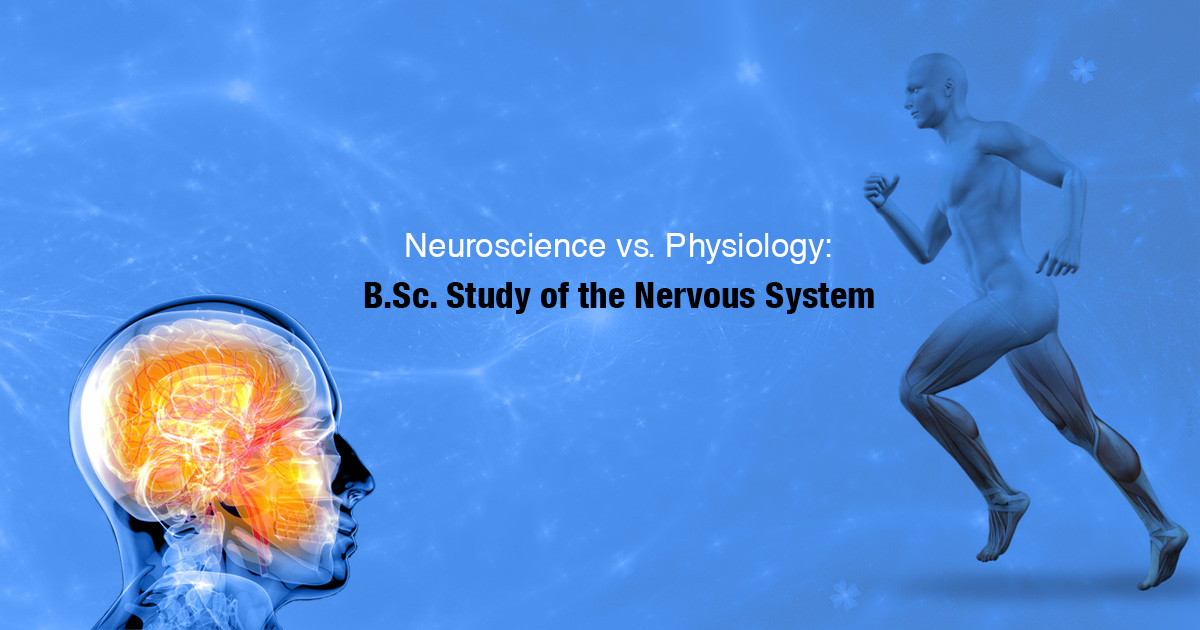Blog Detail


Neuroscience vs. Physiology: B.Sc. Study of the Nervous System
23-09-2024

Neuroscience and physiology are interdisciplinary fields that delve into the human body's complexities. The scientific study of neuroscience and physiology involves expertise from several fields, including biology, chemistry, physics, mathematics, and engineering. The physiology courses provide a foundation for and an extension of the cellular and system neuroscience courses, which explore the intricacy of the nervous system.
Physiology is the study of functional life processes at all levels of biological organisation, from the cellular and molecular to the tissues and organs, and it is a fundamental science that supports both health and sickness. The multidisciplinary area of neuroscience studies the brain and nervous system, the most complicated of these organs. Both programmes provide a solid scientific foundation and open up exciting opportunities for those passionate about understanding the intricacies of the nervous system or the broader physiological processes that sustain life.
Course duration
Both B.Sc. in Neuroscience and B.Sc. in Physiology typically have similar course durations, spanning three years. The initial years of both programmes cover foundational courses in biology, chemistry, and physics, providing students with a solid scientific foundation. The latter years focus on more specialised courses, allowing students to delve into the specifics of their chosen field.
Curriculum
The curriculum of a B.Sc. in Neuroscience is designed to provide a comprehensive understanding of the nervous system at various levels. In the initial semesters, students cover subjects such as biology, chemistry, and physics, along with introductory neuroscience courses. Practical laboratory work is often crucial, allowing students to apply theoretical knowledge in hands-on experiments. As they progress, the curriculum delves into more specialised areas, including:
- Neuroanatomy
- Neurophysiology
- Neuropharmacology
- Molecular neuroscience
- Behavioural neuroscience
- Cognitive neuroscience
- Computational neuroscience
- Neuroimaging techniques
The curriculum of a B.Sc. in Physiology is designed to provide a comprehensive understanding of the physiological processes that occur in living organisms. Students cover foundational biology, chemistry, and physics courses in the initial semesters. Practical laboratory work is also significant, enabling students to gain hands-on experience studying physiological phenomena. As they progress, the curriculum delves into specialised areas such as:
- Cardiovascular physiology
- Respiratory physiology
- Endocrinology
- Neurophysiology
- Exercise physiology
- Clinical physiology
- Environmental physiology
Career opportunities
A B.Sc. in Neuroscience opens up diverse career opportunities. Graduates can pursue roles in research institutions, pharmaceutical companies, healthcare settings, and government agencies. Common career paths include:
- Research scientists contribute to the exploration of the brain and nervous system and may work in academic research institutions, pharmaceutical companies, or neuroscience-focused laboratories
- Clinical research associates work on clinical trials for new medications, treatments, or interventions related to neurological conditions. They collaborate with medical professionals, collect patient data, and ensure studies adhere to ethical and regulatory standards.
- Neuro-technologists operate and interpret data from neuroimaging tools such as MRI or EEG. They may find employment in hospitals, research institutions, or diagnostic centres, assisting in diagnosing and monitoring neurological conditions.
- Pharmaceutical experts may work in areas such as drug development, contributing their understanding of neural processes to design and test pharmaceutical interventions
- Clinical neuropsychologist assistants work under the supervision of licensed professionals to assess cognitive function, administer psychological tests, and assist in the development of treatment plans for individuals with neurological disorders
A B.Sc. in Physiology offers various healthcare, research, sports science, and public health career opportunities, leveraging the understanding of physiological processes. The foundation in physiology also serves as a stepping stone for further education in medicine, physiotherapy, or other health-related professions, such as:
- Clinical physiologists may specialise in areas such as cardiac physiology, respiratory physiology, or neurophysiology, conducting diagnostic tests and providing valuable data to assist healthcare professionals in patient care
- Exercise physiologists work in fitness centres, rehabilitation clinics, or research institutions, designing exercise programmes tailored to individuals' physiological needs and goals
- Pharmaceutical and biotechnology experts may work in roles related to drug testing, efficacy studies, or quality control. Their understanding of physiological processes is crucial in ensuring the safety and effectiveness of pharmaceutical products.
- Environmental physiologists work in research institutions, government agencies, or environmental organisations, studying how physiological systems respond to environmental stressors
With different specialisations and professional paths, neuroscience and physiology provide numerous educational opportunities. Ultimately, one's individual interests, strengths, and career aspirations should determine which option one prefers- whether they are more interested in the more general physiological processes that support life or the more complex mechanisms of the neurological system. Regardless of the route taken, both disciplines contribute substantially to expanding our knowledge of the intricate functioning of the human body.